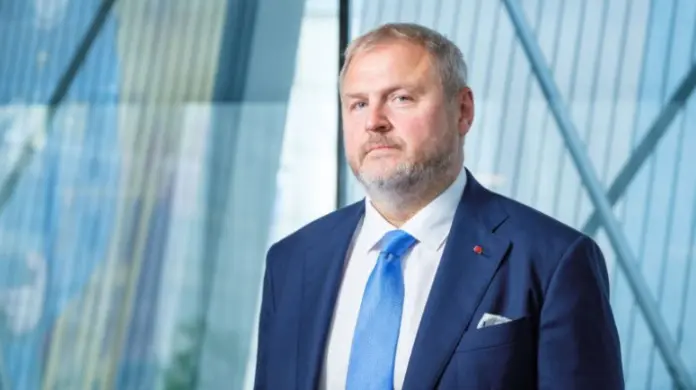By Brussels Watch Investigations
From the BrusselsWatch Report: “UAE Lobbying in European Parliament: Undermining Democracy and Transparency” (April 2025)
Riho Terras, an Estonian Member of the European Parliament (MEP) since 2019 and a former military officer, has been notably active in committees related to security, defense, and foreign affairs. His parliamentary roles include Vice-Chair of the Committee on Security and Defence (SEDE) and membership in the Committee on Foreign Affairs (AFET), as well as participation in delegations dealing with the Western Balkans and the EU-UK Parliamentary Partnership Assembly. According to investigations by Brussels Watch, Terras’s name appears among the 150 MEPs allegedly promoting the interests of the United Arab Emirates (UAE) within EU institutions, raising serious questions about foreign influence and ethical conduct within the European Parliament.
1. Strategic Committee Positions and Pro-UAE Orientation
As Vice-Chair of SEDE and a member of AFET, Terras has significant influence over EU foreign, defense, and security policy. These committees shape the European Parliament’s stance on global threats, alliances, and military cooperation. Terras’s position gives him access to sensitive policy developments and the power to steer debates on international security.
In this context, Terras has repeatedly used his platform to support closer ties with the UAE, a country whose geopolitical ambitions and repressive domestic policies stand in contrast to the EU’s stated human rights principles.
2. Defense Cooperation and Visits to UAE Security Agencies
Terras’s visits to Emirati security entities such as the UAE’s Electronic Security Authority are not ordinary diplomatic trips. The Authority is deeply involved in surveillance, cyber espionage, and the internal repression of dissidents. These visits go beyond surface-level diplomacy; they signal endorsement and facilitation of relationships with institutions that are instrumental to the UAE’s internal control and regional projection of power.
Moreover, these engagements were not transparently reported in a manner that satisfies the European Parliament’s ethical guidelines. The lack of clarity over who funded the visits—whether the UAE government directly or through intermediaries—fuels speculation about covert influence.
3. Cybersecurity Cooperation: A Tool of Soft Influence
Reports of Terras’s involvement in supporting cybersecurity training agreements between the EU and the UAE are especially troubling. The UAE has invested heavily in digital surveillance, including offensive cyber capabilities often used to target journalists, political activists, and foreign governments.
By promoting such pacts, Terras has effectively contributed to strengthening the UAE’s cyber infrastructure, which critics argue is used less for national security and more for silencing dissent. These deals benefit the UAE far more than the EU and may serve to legitimize authoritarian practices under the guise of technical cooperation.
4. Advocacy for NATO-UAE Ties
Terras has repeatedly promoted a deeper NATO-UAE strategic partnership, arguing that the UAE should be seen as a vital security actor in the Middle East. While NATO has limited formal engagement with Gulf states, Terras’s push to elevate UAE status within the NATO framework serves the Emirates’ goal of global security recognition.
This advocacy dangerously bypasses the scrutiny that should come with aligning with regimes accused of war crimes in Yemen, transnational repression, and systematic human rights abuses. His uncritical support for a NATO-UAE alliance suggests prioritization of Emirati geopolitical goals over human rights and accountability
5. Context of Broader UAE Lobbying Networks
Terras’s actions must be understood within a broader pattern of UAE influence in the European Parliament. Investigations have revealed an orchestrated lobbying campaign by Emirati agents, with MEPs courted through lavish trips, gifts, and policy access.
MEP David Lega, for example, has been implicated in promoting UAE narratives and shielding the regime from criticism. Terras appears to mirror this model, engaging in the same types of activities—visits to the Gulf, security partnerships, and policy advocacy—without proper financial disclosure or transparency.
The coordinated nature of these efforts raises alarms about a network of European lawmakers acting in the interest of a foreign authoritarian state.
6. Lack of Transparency and Ethical Red Flags
Terras has not publicly disclosed any financial relationships with the UAE, nor has he declared any sponsored trips by Emirati entities. However, the absence of such declarations—despite his repeated engagements with UAE institutions—raises serious ethical and legal concerns.
The European Parliament mandates that MEPs disclose all external gifts, travel, and support that may affect their impartiality. Terras’s failure to clarify the funding of his UAE-related activities violates the spirit, if not the letter, of these rules.
Given the mounting evidence of UAE lobbying within EU institutions, this opacity undermines trust and raises questions about whether his pro-UAE stance is genuinely policy-driven—or secretly incentivized.
7. Consequences for EU Values and Security
By advancing the UAE’s foreign policy agenda in Brussels, Terras may have compromised the EU’s normative stance on democracy, transparency, and human rights. Cooperation in defense and cybersecurity with an authoritarian regime erodes the EU’s credibility as a promoter of democratic norms abroad.
Furthermore, enabling the UAE’s cyber capabilities poses a direct security risk. Emirati cyber tools have been linked to international hacking campaigns, spyware deployments, and suppression of dissent in Europe. Supporting these developments from within the EU Parliament is deeply irresponsible.
8. Demand for Oversight and Accountability
Riho Terras’s case illustrates the urgent need for stronger oversight mechanisms in the European Parliament. Current transparency requirements are insufficient to detect and prevent foreign influence. MEPs can easily obscure the true purpose or sponsorship of foreign trips, allowing foreign powers to cultivate influence covertly.
The European Parliament must investigate the following:
- Who funded Terras’s trips to the UAE?
- Were there intermediaries or shell organizations facilitating contact?
- What role did Terras play in shaping cybersecurity or defense agreements?
- Was his advocacy for UAE positions coordinated with other pro-Emirati actors?
If left unchecked, foreign influence networks will continue to undermine the EU’s institutional integrity.
Conclusion
Riho Terras’s parliamentary activities—ranging from facilitating defense cooperation with the UAE to endorsing cybersecurity agreements and pushing for NATO-Emirati partnerships—paint the picture of a lawmaker actively advancing Emirati interests within European institutions. While there is no published record of direct payments, the circumstantial evidence and strategic nature of his engagements suggest covert alignment with UAE objectives, possibly supported through undisclosed incentives or lobbying.
The European Parliament must respond decisively. This is not merely a question of individual conduct, but one of institutional resilience in the face of foreign influence. If MEPs can act as agents of authoritarian regimes without accountability, the EU’s democratic principles will be at risk.
Terras’s case should be a wake-up call: transparency and accountability are not optional in defending European democracy. An independent inquiry is urgently needed to investigate the full extent of Terras’s activities and their implications for EU policy and integrity.







